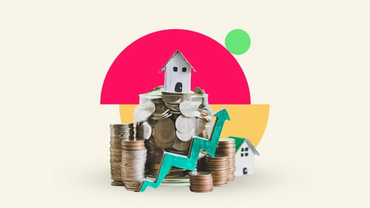Funds Explained: The Ultimate No-Nonsense Guide for Beginners
By Boring Money
What is a fund?
In a nutshell
Funds are ready-made baskets of investments managed for you by an expert. In other words, they're a great way to avoid making a clanger by choosing one duff share! Great for diversifying, investing overseas and for outsourcing the decision-making to a professional.
Listen to our Founder & CEO Holly Mackay explain more about why funds are awesome in the helpful clip below.
A single fund will typically have about 30-60 different "underlying investments" in it. This spreads the risk around and hedges your bets, so rather than having to go and buy 30-60 individual shares all by yourself, you can just buy one fund and be done with it!
You can think of investing in funds like buying a mixed case of wine - you don't have to be a connoisseur and someone else picks the contents they think are good. Funds come in lots of different flavours - such as multi-asset funds or exchange-traded funds. More on these later.
Are funds right for me?
On average, investors hold 49% of their investments in funds, making them one of the most popular investment vehicles out there. But are funds really the right option for you?
If you prefer the freedom and flexibility of choosing which companies to invest in, shares may be a better choice. However, funds can also be highly diversified, which means your investments might be spread across different regions, sectors and assets. This reduces the risk of any one event, such as a political crisis in a single region, having a significant impact on your investments.
So really it comes down to your personal preference. Here's a round-up of some of the main pros and cons to help you decide if investing in funds is the right choice for you.
Why invest in a fund?
A fund is simply the compilation album of the investing world! It’s a nice way to get someone at the sharp end of finance to pick and manage your investments from the bewildering array of bonds and shares on the market. Let’s give a really simple example.
If we ran the Boring Money UK Shares Fund (which we don’t), we might look at all the UK shares out there and say that HSBC, Shell, ITV and GlaxoSmithKline make the grade. And add them to our investment mix. But chuck out Barclays and Burberry and Sainsburys (all random examples by the way, not tips!).
We’d end up with, say, 50 shares in our compilation album, which we bought for £1 each in our pretend world. So our fund would be worth £50. And we might sell 50 units to people for £1 each.
The benefit is that for a small investment of just £1, our investors would have a teeny fraction of an investment in 50 different British companies. And we would run and manage this pool of investments for you - so no need to get the calculator out and crunch any numbers!
There are thousands of funds out there, all with different flavours, and they're among the best ways to get expert help on picking the right investments.
The three main fund structures
1. Mutual fund – also known as an open-ended fund, OEIC or UCITS fund
A mutual fund combines money from multiple investors, which a professional manager invests according to the fund’s goals, such as growth or income, often focusing on specific sectors like European stocks or technology. Being “open-ended,” the fund can adjust its shares based on investor activity, with its value matching the combined value of its holdings. Investors can monitor performance daily through services like Morningstar, comparing it to similar funds or benchmarks like the FTSE All Share for UK funds.
2. ETF – or exchange-traded fund
ETFs, or Exchange-Traded Funds, are investment funds that provide low-cost, diversified access to various markets, similar to mutual funds. Unlike mutual funds, ETFs trade on stock exchanges, with their prices fluctuating throughout the day based on supply and demand. ETFs often aim to track specific assets, like major stock indices (e.g., S&P 500), commodities, or even currencies. They can be structured using "physical" methods (owning a bit of each asset in the index) or "synthetic" methods (using derivatives to mimic asset performance). ETFs can also offer leveraged or inverse options to enhance potential gains or bet against an asset's price. They are generally affordable, easy to trade, and flexible for various investment strategies.
3. Investment Trusts
Investment trusts are publicly listed companies that pool investors' money to buy shares, bonds, or other assets like property. Managed by a board that oversees the fund manager, they operate as "closed-ended" funds, meaning they don’t need to buy or sell assets as investors come and go. This structure suits less liquid investments, and they can also save income from strong years to pay out in weaker ones, offering a steadier return. Investors can buy shares at market prices, sometimes below the actual asset value, and have many options for building a diverse portfolio. Read more on how mutual funds compare to ETFs and Investment Trusts here.
Bonds vs shares
When it comes to investing with funds, you'll often see the "portfolio" - that is, what the fund is actually invested in - broken down into different assets. The two most common assets are bonds and shares, but what actually are they?
What is a bond?
Owning a bond is kind of getting an IOU from a government or a company – you buy their bond and you’re lending them money. The dicier the prospect of getting your cash back, the more ‘interest’ they will pay you to compensate for the risk. So an Ecuadorian mining company bond would pay a gazillion times more than the relatively staid UK government, for example. It’s a riskier loan so they’ll compensate you more for taking this extra risk.
Bonds are influenced by interest rates, so they’re behaving a bit weirdly at the moment. If you lend the UK government money for 10 years, they’ll pay you about 4% (at the time of writing). And inflation is hovering around the 10% mark. So you’ll see why bonds are paying attractive rates at the moment - the UK economy is currently grappling with the risk of high inflation!
What is a share?
Shares are also known as ‘equities’ or ‘stocks’. If you own shares, you buy little pieces of the world’s biggest companies. And tie your fortunes to theirs. It's these shares that make up the majority of most funds.
As a rule of thumb, most ‘equity’ focused funds will have about 40-60 shares in them, although some fund managers have fewer, sticking to their convictions more about which shares are duds and which ones are winners.
Shares are also one of the few investments where you can get a decent income. Companies often pay out a share of their profits as dividends. The key is to look for an ‘equity income’ fund. Pick the right one and you could get an income of around 3-4% a year!
The balance between bonds and shares
Many suggest diversifying, which means a sort-of Combo Meal of bonds and shares. Over the long-term, bonds are usually seen as safer and less choppy than shares, but many believe they will make you less over the long-run too. On the other hand, the stock market can potentially make you profit over the longer-term, but can come with significant short-term risk.
As a general rule of thumb, if you’re a spring chicken and investing for ages in the future, you should probably look at mostly shares. If you’re getting on and likely to need your money soon, people typically prefer bonds because they’re less likely to crash as dramatically as shares, leaving you high and dry if you need to cash in your investments.
Active vs passive
Another couple of phrases you'll often see when investing in funds is 'active' and 'passive', but as the world of finance is renowned for being full of jargon, no one ever seems to explain what these are! Here's what they actually mean and why they matter when deciding on the right fund for you.
What is an active fund?
Most funds in the market are what we call ‘active’. An active fund manager, by definition, thinks he or she is smarter than the average investor. A clever clogs. They think they can spot a bargain. Spot the dog before others. Identify the region that is about to go belly-up. So they pick and choose. If you buy an active fund which invests in shares, you'll usually pay a fee to the fund manager of about 75p-95p for every £100 you entrust to them.
What is a passive fund?
Passive funds, on the other hand, are devoid of ego and opinion. They're the well-behaved end of the fund market. No one makes a call on whether Share A is better than Share B. They simply follow what we call an index - or a list of shares or bonds in any given market. They buy them in proportion to their size and no judgement calls are made. If you buy a passive fund which invests in shares, you'll usually pay a fee to the fund manager of about 8-12p for every £100 you entrust to them. It’s a lot cheaper because it’s run by a computer, rather than an expensive human.
How to decide between active vs passive funds
There are pros and cons to each approach. Passive funds will tend to be cheaper and have performed well over much of the past decade as a result of strong performance from the technology giants (which form a large share of most capitalisation-weighted indices). However, they can have certain biases – the MSCI World has a 70%+ weighting to the US[2], for example. Equally, bond indices can have higher weights in companies that have issued the most bonds – i.e. the most indebted. This can increase risk.
With active funds, there tends to be extremes. Some fund managers will be very successful and deliver better returns than the wider market, while others will find their analysis doesn’t pay off. Investors need to be willing to take a risk on the manager’s skill.
The jury is out on which is best, but passive funds will inherently return the average of any market. Some active funds will go further and smash it – but others will underperform and charge you for the privilege! So it depends on your risk appetite, among other things. Happy to sit back and copy what the markets do? Passive is for you. Want to leave it to the experts to crunch the numbers and try to outperform? Then try active.
Sign up here!
Already have an account? Login
---
[1] PwC, March 2024



